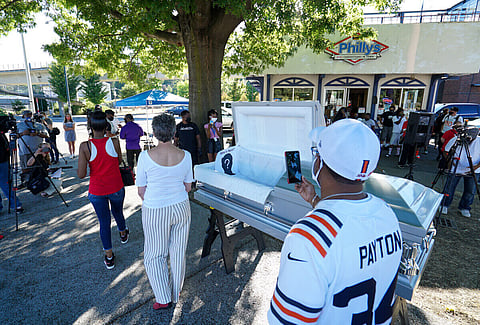Community Groups Urge Focus on Disease, Not Just Symptoms of Gun Violence
by Ashley Archibald
The first six months of 2021 saw an increase in reports of gun violence in King County compared to recent years — violence that was highly concentrated in BIPOC communities and has prompted calls for additional investments to alleviate the conditions that contribute to the shootings.
The King County Prosecuting Attorney's Office (KCPA) released its most recent "Shots Fired" report on July 22, which documents reported gun violence primarily perpetrated in eight jurisdictions in the county as well as a handful of smaller law enforcement organizations.
"Right now, this is not normal. It is much higher than we've ever seen," Prosecuting Attorney Dan Satterberg told the Emerald.
The data showed 42 homicides, 154 nonfatal shootings, and 580 "shots fired" incidents in the first two quarters of the year. That's a 61% increase in the overall number of shooting victims and a 33% increase in shots fired when compared to the four-year average between 2017 and 2020.
These numbers do not include deaths by suicide, self-inflicted gunshot wounds, or police shootings.
The violence is also most prevalent in specific communities — of the 196 people who were shot, 85% were male, 80% were People of Color, and nearly half were Black people.
"It shows that the concentration of gun violence really follows the concentration of poverty in our community in relatively identifiable neighborhoods and individuals," Satterberg said. "If there's any hope in data like this, it tells us where we could invest more — more targeted investments with people who are actually at risk of being shot or becoming shooters."
The County's data is more granular than what appears in the two-page report. That allows Satterberg's office to identify people who have not yet become involved in gun violence either as a victim or a person accused of using a gun but are more likely to do so based on their proximity to other people involved in violent acts.
KCPA then sends that information to community-based organizations like Choose 180 that work with young people proactively to prevent gun violence.
Choose 180 engages with people for an average of 12 months in small-group and individual settings to lessen the likelihood that they will be caught up in the disease of gun violence, said Executive Director Sean Goode, but it doesn't solve the underlying problem.
"It's hopeful, it's transformative, and when we're done working with the young people they still go home and the conditions they go home to may not be any different," Goode said. "What we're doing is supporting them [in] how to navigate successfully and survive in spaces where you can't depend on the conditions being any different and yet you still need to be different in the midst of those conditions."
That's not an easy thing to ask of anybody and why, ultimately, even good programs are not enough.
"We have to be more intentional with our dollars and begin to resource communities to grow and develop and provide them with the infrastructure necessary to live healthy and free of this disease," Goode said.
The public health crisis posed by gun violence worsened during the past year and a half as the coronavirus pandemic raged, disproportionately impacting many of the same communities. The spike in the numbers did not surprise Rene Hopkins, who leads the Alliance for Gun Responsibility, an organization that fights for improved gun laws and policy responses to gun violence.
"When you have major disruption in society from the global pandemic, it makes sense that other public health crises like the epidemic of gun violence would also increase," Hopkins said. "The economic stressors alone are enough to really drive an increase in all kinds of gun violence."
Framing gun violence as a public health crisis would put it in the same category as other major causes of death that the country regulates, from car accidents and speed limits to cigarette smoking, Hopkins said. The Alliance for Gun Responsibility has been behind nearly 30 laws to regulate gun use and sales in the state in the past six years and has its eye on high-capacity magazine restrictions in the next legislative session to reduce the harm caused by firearms in the community.
But that doesn't stop the calls for policing after a spate of deadly gun violence that left four dead over the July 24 weekend and continued into the beginning of the following week. In the Seattle Times, Mayor Jenny Durkan called the arguments over community-based solutions to violence and police "a false choice," saying that both are needed.
But Goode and other community members argue that police do not stop gun violence, they respond to it. Calls for more policing come from outside of the communities impacted by gun violence and don't center the experiences of those who have to deal with it.
"Law enforcement does not play a role in changing that material condition. You can't lock up a disease," Goode said.
Ashley Archibald is the editor of Real Change News and a freelance journalist with previous work in the Santa Monica Daily Press and the Union Democrat. Her work focuses on policy and economic development, and you can find it in the South Seattle Emerald, KNKX, and the Urbanist.
📸 Featured Image: An August 2020 violence prevention rally in South Seattle. (Photo: Susan Fried)
Before you move on to the next story …
The South Seattle Emerald™ is brought to you by Rainmakers. Rainmakers give recurring gifts at any amount. With around 1,000 Rainmakers, the Emerald™ is truly community-driven local media. Help us keep BIPOC-led media free and accessible.
If just half of our readers signed up to give $6 a month, we wouldn't have to fundraise for the rest of the year. Small amounts make a difference.
We cannot do this work without you. Become a Rainmaker today!
Help keep BIPOC-led, community-powered journalism free — become a Rainmaker today.


